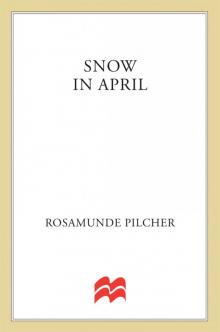- Home
- Rosamunde Pilcher
The Blue Bedroom: & Other Stories Page 2
The Blue Bedroom: & Other Stories Read online
Page 2
His mother was mashing potatoes for lunch. She turned from the stove to look at Toby. “Not twins?”
“No, just one. It’s sucking and it looks all right. Perhaps we’d better tell Tom.”
“Why don’t you go and phone him?”
But Toby didn’t want to ring Sawcombe’s in case Mrs. Sawcombe answered the telephone and he wouldn’t know what to say.
“Can’t you do it?”
“Oh, darling, I can’t just now. Lunch is ready and after that I’m going down to see Mrs. Sawcombe and take her some flowers. I’ll leave a message for Tom.”
“I think he should know now. Mr. Sawcombe always liked to know right away about the lambs arriving. Just in case, he said.”
“Well, if you feel so strongly about it, get Vicky to phone Tom.”
“Vicky?”
“It can’t hurt to ask her. She’s upstairs, ironing. And tell her lunch is ready.”
He went to find his sister. “Vicky, lunch is ready, and Daisy’s had her lamb, and we wondered if you’d ring Sawcombe’s and tell Tom. He’ll want to know.”
Vicky put down the iron with a thump. “I’m not going to ring Tom Sawcombe.”
“Why not?”
“Because I don’t want to, that’s why. You ring him.”
Toby knew why she didn’t want to ring Tom. Because she had been so horrid to him at New Year, and because since that he hadn’t spoken to her. “You ring him,” she said again.
Toby wrinkled his nose. “What will I say if Mrs. Sawcombe answers the phone?”
“Well, get Mother to ring him.”
“She’s too busy and in a hurry because she’s going to see Mrs. Sawcombe after lunch.”
“Why doesn’t she leave a message for Tom?”
“That’s what she said she’d do.”
“Oh, Toby,” said Vicky, in exasperation, “then what’s all the fuss about?”
He said, stubbornly, “Mr. Sawcombe always liked to know right away.”
Vicky frowned. “There’s nothing wrong with Daisy, is there?” She was as fond of Daisy as Toby was, and now she stopped sounding cross and snappy and spoke in her ordinary nice voice.
“I don’t think so.”
“Then she’ll be all right.” She turned off the switch of the iron and stood it up on its end on the board to cool. “Let’s go down and have lunch. I’m starving.”
* * *
The sparse clouds of the morning thickened and darkened and after lunch it started to rain. Toby’s mother, wearing a mackintosh and carrying an immense bunch of daffodils, set off in her car to visit Mrs. Sawcombe. Vicky said that she was going to wash her hair. Toby, at a loose end, trailed up to his room, lay on his bed, and started to read a new book he had got from the library. It was all about Arctic explorers, but he hadn’t got beyond the first chapter when he was interrupted by the sound of a car coming up the lane and stopping with a rattle of gravel outside the front door. He laid down his book, got off the bed and went to the window, and saw Tom Sawcombe’s old Land-Rover, and, getting out of it, Tom himself.
He opened the window, and leaned out. “Hello.”
Tom stopped and looked upwards. Toby saw his fair curly head, beaded with raindrops; his face brown and his eyes so blue; his thick, rugger-playing shoulders beneath the patched khaki jacket that he wore for work. Beneath this was a pair of faded jeans, knee-length green rubber boots.
“Your mother told me about Daisy. Came up to have a look at her. Is Vicky about?”
This was surprising. “She’s washing her hair.”
“Go and get her, will you? I’m not sure there’s not another lamb there, and I’ll need help.”
“I’ll help you.”
“I know, boy, but you’re a bit little to hold an old ewe like Daisy. Better get Vicky.”
Toby pulled his head in from the window and went to do as he was told.
* * *
He found Vicky in the bathroom, with her head in the basin, rinsing her hair with a rubber shower.
“Vicky, Tom’s here.”
Vicky turned off the taps and straightened up, her pale hair dripping all over her T-shirt. She pushed it out of her face, and her eyes were on Toby’s face.
“Tom? What does he want?”
“He thinks maybe Daisy has another lamb inside her. He says he needs help, and I’m not big enough to hold her.”
She grabbed a towel and wrapped it around her head. “Where is he?”
“Downstairs.”
Already she was out of the bathroom, running down the landing, down the stairs. Tom was waiting for them, having let himself into the house, as he had always done in the old days before he and Vicky had had their quarrel.
“If there’s another lamb,” said Vicky, “won’t it be dead by now?”
“We’ll have to see. Get me a bucket of water, there’s a good girl, and some soap. Bring it down to the field. Come on, Toby, you come with me.”
Outside, it was now pouring with rain. They went down the lane and crossed the long, wet grass by the rhododendrons, then climbed the fence. Through the downpour, Toby could see Daisy waiting for them. She was on her feet again, sheltering the single lamb, keeping her head towards them. As they approached she made a sound, deep in her chest, but it in no way resembled her usual healthy bleat.
“There, girl. There.” Tom spoke gently. “There she is.” He went right up to her, and with no fuss took hold of her horns. She did not struggle as she usually did when someone did this. Perhaps she knew that she had to have help and that Tom and Toby had come to help her. “There, girl, quietly now.” Tom passed a hand down her back, down the thick, rain-sodden fleece.
Toby watched. He could feel his heart beating, not so much with apprehension as excitement. He was not afraid, because Tom was there, just as he had never been afraid of anything if Mr. Sawcombe stood beside him.
“But, Tom, if she’s got another lamb inside her, why hasn’t it come out?”
“Maybe a big fellow. Maybe hasn’t got himself in the right position.” Tom looked towards the house, and Toby followed his gaze and saw Vicky, with her long spindly legs and her seal-wet hair, coming down across the field towards them, weighted sideways by a slopping bucket. When she reached their side and had dumped the bucket down, Tom said, “Good girl. Now, you hold her, Vicky. Firmly, but quite gently. She won’t struggle. Keep your fingers tight in her fleece. And Toby, you take her horns, and keep talking to her. Reassuring like. Then she’ll know she’s in good hands.”
Vicky looked as though she were about to burst into tears. She knelt, right there in the mud, and put her arms around Daisy and pressed her cheek against Daisy’s woolly flank. “Oh, poor Daisy. You’ve got to be very brave and it will be all right.”
Tom stripped off. His jacket, his shirt, his white T-shirt. Naked to the waist, he soaped his hands and arms.
“Now,” he said. “Let’s see what’s going on.”
Toby, clinging to Daisy’s horns, wanted to close his eyes. But he didn’t. Keep talking, Tom had told him. Reassuring like. “There, there,” said Toby to Daisy because that was what Tom had said and he could think of nothing else. “There, there, Daisy dear.” This was birth. The eternal miracle, Mr. Sawcombe used to call it. This was life starting, and he, Toby, was helping it to happen.
He heard Tom. “There we go. There we go … take it easy, old girl.”
Daisy gave a single moan of discomfort and displeasure, and then Tom was saying, “Here he is! What a whopper, and he’s alive.”
And there it was, the little creature who had been the cause of all the trouble. A white ram with black spots, smeared with blood and lying flat on its side, but still a sizey, healthy lamb. Toby let go of Daisy’s horns and Vicky eased her loving stranglehold. Released, Daisy turned to inspect the new arrival. She made a soft, maternal sound, and stooped to lick it. After a little, she nudged it gently with her nose, and before very long, it began to move, to raise its head, to struggle, amazingly, t
o its long and unsteady legs. She licked it again, recognising it as her own, taking responsibility, loving and caring. The little lamb took a drunken step or two, and, before very long, with some encouragement from his mother, started to suck.
* * *
Long after Tom had dried himself off with his shirt and then pulled on his clothes, they stayed there, oblivious of the rain, watching Daisy and her twins; fascinated by the miracle, and yet delighted with themselves and their combined achievement. Vicky and Toby sat side by side on the ground beneath the old Scotch pine, and there was a smile on Vicky’s face that Toby hadn’t seen in ages.
She turned to look at Tom. “How did you know there was another lamb there?”
“She was still pretty bulky and she didn’t seem very comfortable. She was restless.”
Toby said, “That’s a two-hundred-percent lambing Mrs. Sawcombe’s got.”
Tom smiled. “That’s it, Toby.”
“But why didn’t the lamb come of its own accord?”
“Just look at him! He’s a big fellow, with a big head. He’ll be all right now, though.” He looked down at Vicky. “But you won’t be all right if you sit there in the rain much longer. And you’ll catch a cold with your hair so wet.” He stooped and picked up the bucket, then held out his other hand to Vicky. “Come along now.”
She put her hand into his and he pulled her to her feet. They stood smiling into each other’s faces.
He said, “It’s good we’re talking.”
“Yes,” said Vicky. “I’m sorry.”
“Just as much my fault.”
Vicky looked shy. She smiled again, ruefully, the smile turning down the corners of her mouth. “Don’t let’s quarrel again, Tom.”
“My grandfather used to say life’s too short for quarrels.”
“I haven’t said how sorry I am … about him … we’re all at a loss. I don’t know how to say it properly.”
“I know,” said Tom. “Some things don’t have to be said. Come along now.”
They seemed to have forgotten about Toby. They walked away from him, up the field, with Tom’s arm around Vicky, and Vicky’s wet head on his shoulder.
He watched them, and felt satisfied. Mr. Sawcombe would have been pleased. He would have been pleased about Daisy’s twins, as well. The second lamb was indeed a handsome fellow, not simply a whopper as Tom had described him, but with beautiful even markings and a pair of horns, like buds, already visible, bedded in soft, curly wool. He wondered what Mrs. Sawcombe would call this lamb. Perhaps she would call him Bill. He stayed until it grew too wet and cold to stand any longer, so he turned his back on the sheep and started to walk home.
His mother returned from her visit to Mrs. Sawcombe and gave him a splendid tea of fish fingers and chips and beans and plum cake and chocolate biscuits and cocoa. While he ploughed his way through this, he told her of the great adventure with Daisy. “… and Tom and Vicky are friends again,” he told her.
“I know.” His mother smiled. “He’s taken her off in the Land-Rover. Vicky’s having her supper at the Sawcombes’.”
After tea Toby’s father came home from the office, and they watched football together on television, and then Toby went upstairs to have a bath. He lay in the hot, steaming water that smelt of pine essence on account of he had stolen some out of Vicky’s bottle, and decided that, after all, it hadn’t been too bad a day. And then he decided to go and pay a call on his Granny, whom he had not seen all day.
He got out of the bath, put on his pyjamas and dressing gown, and went down the passage that led to her flat. He knocked at the door and she called “Come in,” and it was like going into another world, because her furniture and curtains and things were so different to those in the rest of the house. No other person had so many photographs and ornaments, and there was always a little coal fire burning in the grate, and by this, in her wide-lapped chair, he found his Granny, knitting. As well, she had a book on her knee. She had television but she didn’t enjoy it too much. She preferred to read, and Toby always thought of her deep in some book or other. But whenever he interrupted her, she would place a leather bookmark between the pages, close the book, and lay it aside so as to give him her undivided attention.
“Hello, Toby.”
She was terribly old. (Other boys’ grandmothers were often quite young, but Toby’s was very old because, like Toby, his father, too, had been an after-thought.) She was thin, as well. So thin that she looked as if she might snap in two, and her hands were almost transparent, with big knuckles over which she could not get her rings, which meant that she wore them all the time, and very sparkly and dashing they looked.
“What have you been doing today?”
He pulled up a stool and sat down to tell her. He told her about Mr. Sawcombe, but she already knew. He told her about Willie making a coffin for Mr. Sawcombe. He told her about not playing with David, and he told her about Daisy’s lamb. And then he told her about Vicky and Tom.
Granny looked delighted. “That’s the best. They’ve patched up that silly quarrel.”
“Do you think they’ll fall in love and get married?”
“They might. They mightn’t.”
“Were you in love when you married Grandpa?”
“I think I was. It’s so long ago that sometimes I forget.”
“Did you…” He hesitated, but he had to know, and Granny was a person who never minded awkward questions. “When he died … did you miss him very much?”
“Why do you ask that? Are you missing Mr. Sawcombe?”
“Yes. All day. All day I’ve been missing him.”
“It’ll get better. The missing bit will get better and then you’ll only remember the good times.”
“Is that how it was with you and Grandpa?”
“I think so. Yes.”
“Is it very frightening to die?”
“I don’t know.” She smiled, her familiar smile, amused and gamine, that was so surprising in that old and wrinkled face. “I’ve never done it.”
“But…” He looked intently into her eyes. Nobody could live forever. “But aren’t you frightened?”
Granny leaned forward to take Toby’s hand into her own. “You know,” she said, “I’ve always thought that each person’s life is like a mountain. And each person has to climb that mountain alone. To begin with, you start in the valley, and it’s warm and sunny, and there are lots of meadows and little streams, and buttercups and things. That’s when you’re a child. And then you start to climb. Slowly, the mountain becomes a little steeper and the going isn’t so easy, but if you stop every now and then and look about you, then the wonderful views are worth every bit of effort. And the very top of the mountain, the peak, where the snow and the ice glitter in the sunshine and it is all beautiful beyond belief, why, that is the summit, the great achievement, the end of the long journey.”
She made it sound magnificent. He said, full of love for her, “I don’t want you to die.”
Granny laughed. “Oh, my darling, don’t worry about that. I’m going to be around, being a nuisance to you all, for a long time yet. And now, why don’t we each have a peppermint cream, and then a game of clock patience? How nice that you came to see me. I was beginning to be a little tired of my own company…”
* * *
Later, he said goodnight and left her; went to clean his teeth, and then to his bedroom. He drew back the curtains. It had stopped raining and there was the beginnings of a moon climbing the sky in the east. In the half light, he could see the paddock and the dim shapes of the sheep and their lambs, gathered beneath the sheltering branches of the old pine. He took off his dressing gown and got into bed. His mother had put a hot-water bottle into it, which was a treat, and he pulled this up onto his stomach and lay wide-eyed in the soft darkness, feeling warm and thoughtful.
He decided that today, he had learned a lot. A lot about life. He had helped at a birth, and had seen, in Vicky and Tom, the start of a new relationship. Perhaps
they would get married. Perhaps not. If they did get married, then they would have babies. (He already knew how babies started because once, in the course of a manly chat about cattle breeding, Mr. Sawcombe had told him.) Which would make him, Toby, an uncle.
And as for death … Death is a part of life, his mother had told him. And Willie had said that death was a secret between God and himself. But Granny believed that death was the glittering, shining peak of each person’s private mountain, and that perhaps was the best, the most comforting of all.
Mr. Sawcombe had climbed his mountain and reached his peak. Toby imagined him, standing there triumphant. Wearing sun-goggles because of the brightness of the sky, and his best Sunday suit, and perhaps holding a flag.
He was suddenly very tired. He closed his eyes. A two-hundred-percent lambing. How satisfied Mr. Sawcombe would have been, and what a pity that he had not lived long enough to know about Daisy’s twins.
But as sleep crept up on him, he smiled to himself, because, for no particular reason, he was suddenly pretty certain that wherever he was now, his old friend already knew.
Home for the Day
After a European business trip that had taken in five capital cities, seven directors’ lunches, and countless hours spent in airport lounges, James Harner flew into Heathrow from Brussels on a Wednesday afternoon in early April. It was, inevitably, raining. He had not got to bed until 2 a.m. the previous night, his bulging briefcase weighed heavy as lead, and he seemed as well to have caught a cold.
The smooth and shaven face of Roberts, the advertising agency’s driver who had come to meet him off the plane, was the first cheerful thing that had happened to him all day. Roberts wore his peaked cap, and he moved forward to relieve James of his suitcase, and to say that he hoped he had had a pleasant trip.

 Wild Mountain Thyme
Wild Mountain Thyme Sleeping Tiger
Sleeping Tiger Flowers in the Rain & Other Stories
Flowers in the Rain & Other Stories September
September The Blue Bedroom: & Other Stories
The Blue Bedroom: & Other Stories The Carousel
The Carousel The End of Summer
The End of Summer Snow in April
Snow in April The Shell Seekers
The Shell Seekers Under Gemini
Under Gemini The Empty House
The Empty House The Day of the Storm
The Day of the Storm Another View
Another View Voices in the Summer
Voices in the Summer The World of Rosamunde Pilcher
The World of Rosamunde Pilcher Voices In Summer
Voices In Summer Blue Bedroom and Other Stories
Blue Bedroom and Other Stories